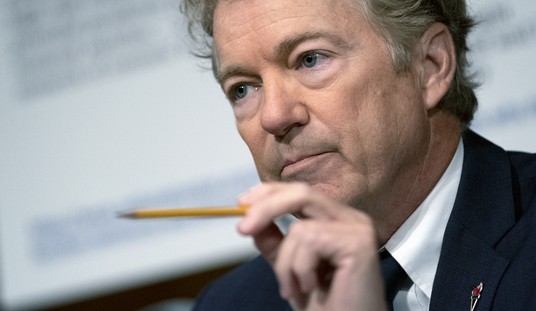Just how many cliffs do we face at the end of the year, anyway? We’ve been debating about policy and strategy over the fiscal cliff, but Power Line’s Paul Mirengoff defines the standoff as three cliffs — debt, fiscal, and political. Paul explains:
There is an economic cliff out there, though. It’s the debt cliff. Eventually, our nation’s massive debt will lead to a serious crisis of the kind certain European debtor nations are experiencing. But that cliff doesn’t face us at the end of the year or, in all likelihood, very soon.
Even so, the time to deal with the debt cliff is now. Delay only will make the cliff steeper.
Unfortunately, only the Republicans are serious about acting now to avoid the debt cliff. The Democrats are debating among themselves whether entirely to bypass entitlement reform — a prerequisite to dealing meaningfully with the debt — or to nod in the direction of such reform without really tackling it. And the Republicans, controlling only the House, cannot force the Democrats to get serious about entitlement reform because the Dems would rather go over the so-called fiscal cliff than take the tough measures that would put Medicare and Social Security on a sound long-term footing.
This brings me to the third cliff — the political one. It’s the cliff that one of the two parties will likely go over if no budget deficit deal is reached, we therefore go over the “fiscal cliff,” and the economy spirals into a recession.
Which one of the parties will experience the political cliff if we do a Thelma & Louise off either or both of the first two? Paul isn’t terribly optimistic about the prospects for Republicans winning the argument, and a loss could be devastating. Democrats now have a 10-seat majority in the Senate, while the Republican margin in the House is slimmer than before the election this month. Obama will be President no matter what happens in 2014, but a financial debacle that ends up being blamed on Republicans could lose the GOP control of the House and no chance to gain control of the Senate — and that would give Obama a free hand for any brand of mischief he chooses in his final two years.
Therefore, Paul advises Republicans to get the best deal they can for now, and work towards solutions for both the fiscal and debt cliffs:
Because Republicans cannot do much about the debt cliff and because going off the political cliff would be catastrophic, Republicans must approach negotiations regarding the fiscal cliff cautiously. They should not feel guilty about doing so. If the American people had given Republicans the power to make major headway on the debt, the party would be obligated to try whatever that takes, the political consequences be damned. But the electorate chose to give Republicans only a little power.
With a little bit of power comes a little bit of responsibility. This means bargaining hard to reduce spending and to do some entitlement reform. It does not mean taking positions that will strike voters as so hardline that Democrats will be able to portray Republicans as the villain of the piece, i.e., the reason why the country went over the fiscal cliff and experienced an economic downturn.
In my column for The Fiscal Times, I argue the same thing. Elections have consequences, and voters gave more power to Democrats than to Republicans three weeks ago. That’s a fact of life, and we have to make the best deal we can. However, this recent rash of irresponsibility in budgeting has to get resolved by returning to a normal budgetary process, a demand Republicans should be making publicly every day during the crisis:
Perhaps this sounds hopelessly nostalgic, but most of us recall when elections had consequences, and problems got addressed through normal compromise. Voters in this election supported split government, expressing a desire for middle ground. Yet none of the leadership in Washington seems to understand this, and voices on both sides have begun arguing for strategies that would force gridlock all the way to another election.
This is not only absurd, it’s dangerous. The impact of going over this cliff will cost the economy $200 billion in consumer spending alone, according to the White House’s own numbers, which would almost certainly push us into a full-fledged recession, or worse. But the damage to the political system might be even more long-lasting. We do not have a parliamentary system for guaranteed winner-take-all outcomes, but a system that usually produces stability and the need for finding at least enough common ground to govern properly. If that system is perceived to fail, don’t be surprised to hear extreme voices proposing extreme measures to rectify those failures.
The core of this standoff is the budgetary process in Congress, which has run off the rails for more than three years. Despite the requirements of the Congressional Budget Act of 1974 that both chambers produce a budget resolution each year, the Senate under Democratic control has refused to do so since 2009. Instead, Senate Majority Leader Harry Reid has opted to litigate budget conflicts through high-profile standoffs and crises, rather than through the normal process of budget adoption and conference committees.
While there is plenty to dislike about conference committees and budgeting, it traditionally allows for rational compromises on key differences without turning each of them into crisis points. The House under Republican leadership has produced a budget each year, but the Senate refuses to do so, even though a simple majority can pass budgetary bills, which cannot be filibustered. It is long past time for Democrats in the Senate to prioritize budgets over hobby horses.
Voters send politicians to Washington to solve issues, not find ways to obstruct until they can elect more of their own party. It’s time for both sides to accept the consequences of this election, end the campaigns, and start providing solutions.
The loudest voices seem to be demanding three different strategies for dealing with this twice-delayed crisis: obstinacy, total surrender, and something in between. The first two are almost equally irresponsible. Refusing to do anything will create a significant, or perhaps enormous, amount of economic and fiscal damage in the short run, in the vain hope that the disaster will produce total control for one party two years from now (which, for Republicans, is impossible with Obama winning a second term anyway), or in the equally vain hope that obstinacy will certainly make the other side blink. The second option, in which the GOP votes “present” on Democratic proposals in order to stick them with the blame for bad policy, is almost as bad, especially when Republicans control the House and can negotiate at least some good policies to balance out the bad. The third option is the way our political system is supposed to function — and it’s more than past time for us to return to it.
Update: Jennifer Rubin makes a similar point:
The problem with the constant drumbeat of anger and revenge against elected officials is not only that it hands victories to the other party (which nominates reasonable-sounding candidates), worsens our fiscal predicament and turns off all but the hardcore base ( well, that’s a lot right there, I grant you); rather, the problem for purveyors of this sort of politics is that it doesn’t wear well over time.
You can’t threaten every week to throw out every pol who is less than pristine without sounding like an LP with a skip ( young folks, this is how music once was played). Eventually donors, voters, listeners and candidates get fed up or bored with the rant-a-thon. Hysteria is tiring. (And once the subjects of your ire get reelected they learn to ignore you.)
None of this is an argument for mushy moderation or split-the-baby politics. (You can legislate in bold color while still giving the other side what is essential to make a deal.) It is, however, a reminder that conservatives who want to govern cannot simply stamp their feet, yell at the other side and blame the media. To obtain conservative ends you first have to attract majorities (hard when you sound like you’re on your fifth espresso) and then be willing to accept imperfect legislation that advances the essential conservative value — freedom.
Most voters want solutions, not perpetual campaigns — especially in the immediate aftermath of an election.








Join the conversation as a VIP Member